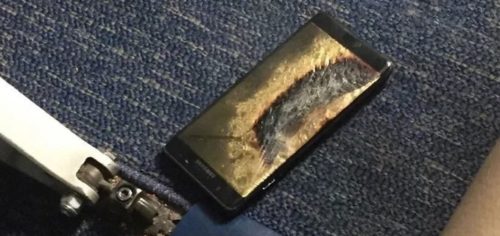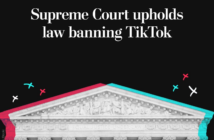By Rafal Matuszczak
As students prepare to head home for thanksgiving, Samsung Galaxy Note 7 has been banned from American air transportation.
On Oct 14, The Department of Transportation (DOT) announced that these smartphones are not allowed to be on airlines due to the high risk they pose. DOT will not allow passengers to travel with the phone “on their person, or in carry-on baggage, or in checked baggage on flights to, from, or within the United States.” Anyone trying to travel with the device will be denied boarding and anyone attempting to sneak the device on the plane, “may be subject to criminal prosecution in addition to fines,” according to the DOT.
In fact, after several reported incidents of overheating and burning devices worldwide, Samsung announced a voluntary recall and exchange program on Galaxy Note 7 smartphones sold in the U.S before Sept. 15, 2016. The program has been launched in cooperation with the U.S. Consumer Product Safety Commission (CPSC).
When Samsung released its newest device in the U.S and Australia on Aug. 19, probably, nobody from the company had expected the problems that might occur after the first customers started using the smartphones. Exactly two weeks later, the South Korean multinational tech giant had to recall all the devices.
Not only were the phones overheating, but some of the devices exploded or caught fire, causing fires and injuries to the users.
Some customers sued the company for damages caused by the devices. One of the first people to sue the company is a Florida resident.
Jonathan Strobel, of Boca Raton, sued the company because the device exploded in his pocket burning his right leg and a thumb while he was trying to remove the smartphone from his pants.
The Washington Post reports after 35 reported incidents of the devices exploding during or after charging, Samsung decided to recall the devices and the company stated that the phone has “failure rate of about 24 per every million;” however, cnet.com reports that this number quadrupled after the recall announcement was made.
On Sept. 2, Samsung announced that the customers who already purchased the device should stop using them immediately. At that time, the company also launched the recall program.
In fact, Amanda Chittum, a senior biomedical health science major, who bought a Samsung Galaxy Note 7, has to return the phone although her phone has not exploded or gotten hot either.
“I did not want to return the phone. I had to due to the recall. I enjoyed all of the features screen quality, s pen, great camera, edge screen, etc. I had to because I can’t fly with it when I leave to visit my family for thanksgiving and Samsung issued mandatory updates to the phone model limiting battery usage to 60%,” said Chittum. “It was a big hassle. I had my first one for 2 weeks when the first recall came out. [I] got it replaced then the second recall came out another 2 weeks later. I’m bummed that I had to down grade.”
However, despite the safety issues and the recall, many users decided to continue using the devices after Samsung’s statement regarding the phone was announced. Based on the data acquired by Apteligent, a mobile analytics firm, about 87 percent of the devices were still in use, as late as 12 days after the announcement. Even though the data was collected after multiple airlines had decided to ban using the devices on board, and Samsung itself warned the users that continuing to use the smartphones was dangerous, but the customers did not seem to listen to the notices.
Because the overheating problem is strictly associated with the phones’ battery, Samsung decided to release a software update that would prevent the phones to be charged no more than 60 percent, as Chittum mentioned. The purpose of this update was to minimize the risk of catching fire while the devices are charged.
Nevertheless, Samsung Galaxy Note 7 is not the first device that has experienced this kind of issues with batteries. Last year, Hoverboards had some issues with their batteries with there being several incidents where these devices caught fire, and as a result Hoverboards had been banned from Saint Leo campus. However, Campus Security has confirmed that these smartphones have not been banned as of yet.
Fortunately, Samsung made steps to resolve the issue immediately, and the customers who have the inconvenience of returning their phone do not have to worry about losing any money. In fact, everybody who returns the device receives a $25 gift card as a recompense, according to cnet.com. Also, the customers have a choice of replacing the phone with another Galaxy Note 7, or they can get Galaxy S7 or Galaxy S7 Edge. In case the customer decides to use the second option, the company will return the price difference.
However, many customers are having problems returning this phone, including Chittum. Chittum received a replacement Galaxy S7 edge and still attempting to return the Note 7; however, she is having trouble retuning the phone because she has not received a box to send the phone back in.
“I am very disappointed with Samsung, but chose to get another Samsung phone because of the higher refund incentive ($100 vs $25). The only refunds I have received so far are from Verizon crediting me the monthly payments I paid for the 2 months I had it. As I understand I won’t get refunded for the phone until my note 7 is sent back, but can’t because I don’t have a box,” said Chittum. “When I took it to a store to take it back they told me I could get a new phone from them but they won’t take my note 7 from me. I have to wait for Verizon or Samsung to send me a box (still waiting).”
Also, the customers might also just receive a refund if they decide not to use any of the options. Customers who have been affected by the issue might be concerned about their safety while using other devices produced by Samsung; but they are assuring customers the issue is associated with Galaxy Note 7 only.
The impact the situation had on the company is gigantic. In about two days, right after announcing the recall program and stopping the sale of the smartphones, Samsung lost nearly $22 billion. The company had to recall about 2.5 million devices, according to Bloomberg.com.
Besides money, one of the biggest losses the company experienced is its reputation. It is possible for an organization of this size to recover from losing even billions of dollars. However, in recovering the reputation that has been lost might be a much more difficult challenge to accomplish, according to Forbes.com.
The fact that in the meantime, the company’s most significant competitor released their newest product, Apple iPhone 7 Plus, just made the situation worse.
The company announced that the Galaxy Note 7 will be back on sale when the recall program is completed so that all the users who were affected and had to return their phones will receive a replacement as soon as possible. As for now, it is still unknown when it is going to happen, and how long all of those people who would like to buy the smartphone will have to wait.
The company’s executives in Korea, as well as in the United States, apologized for any inconvenience.
“With battery cell defects in some of our Note 7 phones, we did not meet the standard of excellence that you expect and deserve. For that, we apologize, especially to those of you who were personally affected by this,” said Tim Baxter, the president of Samsung Electronics America, according to cnbc.com.
Although the Samsung’s problematic situation seems to be resolved now and people are aware that the smartphones are hazardous, the issue that the company encountered with the battery cells proved that the newest technology might be as dangerous as it is useful.
Battery Safety
According to the information revealed by Samsung, the company conducted an investigation and found that the phones have a battery cell issue. The modern smartphones use lithium-ion batteries as their source of power. The batteries consist of lithium-ion cells which include multiple layers, where each of them includes a positive and negative electrode which are separated by an insulator.
According to a chemical engineer at University College London, Donal Finegan, who was interviewed by Forbes.com, whenever the materials inside a cell are moved around, the insulating layer that separates the positive and negative electrodes can tear. When that happens, it causes a short circuit that might create a spark.
Because the lithium cells are carried by electrolyte solution, which is a highly flammable liquid, even the smaller spark might cause a thermal reaction that might lead to an explosion. Even though using lithium-ion batteries can be dangerous, they still continue to be used so due to their high performance.
Finegan indicated that battery failures are very rare, so most of the time users do not have to be concerned about their safety. However, it is important to know there is a possibility, and the more powerful the batteries are, the denser the material they are made of, which increases the probability of battery failures.
Battery overheating might also be caused by simply leaving a phone in a hot environment. Sunny Florida days do not help, especially when phones are left in cars, where the temperature rises quickly. In fact, it has been reported that the Galaxy Note 7 caused fires in cars in Florida, according to foxnews.com.
Charging a battery is not a fully safe procedure itself. Even though the smartphones are equipped with software that tells the chip inside a phone to stop charging the battery when it is fully loaded, if the security system fails, it is possible that the battery will start to overcharge.
In such situation, the current still flows into the battery even though it is full which can make it very unstable. If it happens, the probability that the battery overheats significantly increases, and it is possible that it will soon be caught on fire.






